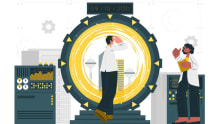Driving performance and careers in the enterprises of tomorrow

The pandemic-induced upheaval forced organizations to rethink the very tenets of business management. As new skills and new expectations emerged, managing one’s talent became a core business priority. The sudden shift to virtual working threw up a new way of organizational life, in a world already disrupted by automation and AI. Performance management as we knew it, took a backseat as employees rose to the occasion to perform in daunting and unheard-of circumstances. As we move from survival to thrive, the skills for success at an individual, function, and organization level will continue to evolve. This is especially true as the Future of Work becomes increasingly hybrid, and agile working becomes all-important for future success. It is imperative that employers engage and empower their human capital for high performance, through an agile performance management system, such that people-outcomes are attuned to the dynamic business needs.
The Next Generation Performance Paradigm is Data-Driven
Performance management constructs have undergone massive change, from a command-and-control approach to a direct-and-develop approach. The outlook of holding individuals accountable for past performance no longer exists. As business becomes more disruptive by the day, the business value of traditional employee performance management models is collapsing. While these legacy systems still form the basis for decision-making around compensation, promotions, terminations, and other compliance-mandated functions, the real decisions of the future shall stem from individual advancement and organizational growth. Hence, to understand the employee-milieu and align it with business strategy, organizations must embed deep analytics in the performance management design. Futuristic performance management systems must espouse the values of agility, fluidity, and growth mindset to drive the right performance behaviors.
Traditional performance management systems often result in undocumented feedback and bias, affecting the fairness of the performance evaluation process.
Hence, the next-generation performance management approach must derive from quantitative data and qualitative insights to help deliver desired business results. Big Data, Artificial Intelligence, and Machine Learning shall help gather data, process multiple information, and offer meaningful insights with real-time performance analysis. Following are the reasons to adopt such a technology-led PMS solution:
- Time-efficient and credible
- Offers coaching insights so as to groom talent to perform instead of pressurizing talent to achieve outcomes
- Fosters team-work and collective accountability
- Drives constructive criticism through ongoing feedback
- Helps customize talent outcomes to business needs by defining data-backed objectives and frameworks
- Drives efficient tracking of performance, updates, and progress through conversational tools
- Helps identify and predict performance behaviors with hyper-personalized contextual data insights for individuals, teams, and organizations
- Curates a great employee experience through ‘consumable’ constructs such as gamification, 360-degree feedback systems, ongoing dialogue, and so on.
Data is a powerful tool for both employees, managers, and leaders. They will be able to access and act on real-time workforce insights to understand what the workforce is capable of in the future. This shall support better and faster decisions that are well-aligned with future business priorities. For this, HR must inculcate ‘developmental’ as well as business-aligned features in the PMS design.
The Must-Haves in PMS Design
Technology must act as an enabler to drive human behaviors for success. Hence, merely implementing Big Data, Analytics, and AI is not enough. High-tech must be complemented with high-touch, to intrinsically motivate employees and teams to bring their best selves to work. For this, HR and business leaders must look at the following features in the PMS design:
- A goal-setting module that dynamically ‘talks to the business strategy
- Continuous communication channels across levels
- 360 degrees feedback and ongoing feedback mechanisms
- Dashboard performance-view for employees, managers, and leaders
- Real-time creation of goals with metrics for KPI measurement and tracking
- Coaching and mentoring capability
- User-friendly interface
- Upgradable and scalable for future business needs
The pandemic highlighted the importance of ‘softer’ aspects related to performance management. PMS for tomorrow must be holistic and integrated, encompassing wellbeing, employee engagement, learning & development, HR Policy and Operations, Total Rewards, Succession Planning, Employee Mobility, and much more. Merely developing a data-driven intelligent and intuitive PMS is not enough, it must be integrated into the overall HR workflow.
Next-generation performance management finds foundation in the values such as openness, transparency, fairness, collaboration, social, growth mindset, etc. To institutionalize these in the system design requires an ongoing buy-in from leadership since it is an organization-wide transformation at all levels- systems-tools, processes, and people-mindset. Leaders must not lose sight of the business direction which investing in a performance management system. People-growth and business growth must go hand-in-hand to create a sustainable high performing enterprise.















